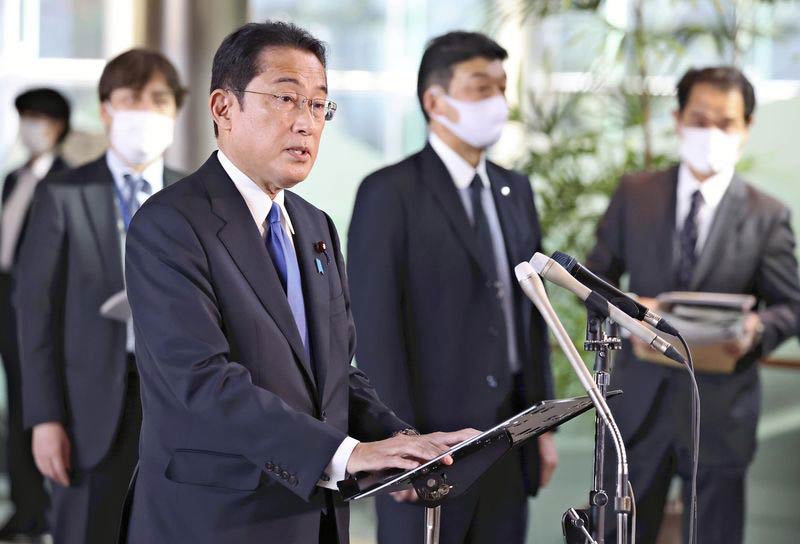
Prime Minister Fumio Kishida announces border control measures against the omicron variant at the Prime Minister’s Office on Monday.
November 30, 2021
Learning from the insufficient response to the coronavirus crisis by the cabinets of former prime ministers Shinzo Abe and Yoshihide Suga, the government is aiming to make a preemptive strike against the new omicron variant by banning all nonresident foreigners from entering Japan in principle.
Although there are many unclear factors about the new variant, including how infectious it is, Prime Minister Fumio Kishida based his decision on the assumption of a worst-case scenario.
When Kishida announced at the Prime Minister’s Office on Monday that border control measures would be tightened, he said emphatically, “I’m ready to accept all criticism that I’m being too cautious about the omicron variant, even though its impact is still unknown.”
Following announcements on Thursday that the new variant has been detected in South Africa and other countries, the Japanese government said Friday that returning Japanese nationals and reentering foreign residents who had recently been to any of six countries, including South Africa, would have to quarantine at government-designated facilities for 10 days.
According to an aide to the prime minister, the action was taken before the World Health Organization designated the omicron variant as a variant of concern because stock prices were falling around the world, and the government decided a swift response was necessary.
Cases of coronavirus infection have been falling in Japan, so the government allowed — at the request of domestic business circles — some new arrivals of nonresident foreigners from Nov. 8, including short-term business visitors and foreign students and technical interns. Certain conditions had to be fulfilled, including the submission of plans describing their activities in Japan.
Kishida decided quickly to stop the entry of nonresident foreigners this time because he wanted to draw on the lessons learned from the Abe and Suga cabinets.
In the early days of the virus’ spread, the United States denied entry to foreign nationals who had traveled anywhere in China. In contrast, the then Abe Cabinet barred only foreign travelers who had been to China’s Hubei Province, a response that was criticized as inadequate.
In spite of the spread of coronavirus variants, the then Suga Cabinet did not quickly suspend the flow of businesspeople between Japan and 11 other countries and regions, sending its approval rating down.
Masahisa Sato, director of the Foreign Affairs Division of the ruling Liberal Democratic Party, has criticized the Suga Cabinet’s response to the pandemic. Sato told reporters on Monday, “Compared with earlier measures against the pandemic, the Kishida Cabinet has been promptly responding to the coronavirus.”
The prime minister intends to deal flexibly with coronavirus control measures from now on. However, if the government continues to take strict measures in this regard, that could hinder economic activities that had been headed toward normalization.
Although the government has drawn up a strategy to ease border control measures toward the year-end and New Year season, and to facilitate preparations for accepting foreign tourists, it will likely be forced to review that plan.
Go To resumption eyed
Kishida met Monday with Kenichiro Yamanishi, chairman of the Japan Travel and Tourism Association, and others. At that gathering, the prime minister said he wanted to consider resuming the government-initiated Go To Travel campaign to help the domestic tourist industry, which has been suspended since the end of last year, during the year-end and New year period.
Kishida indicated he would make a cautious decision based on the spread of the omicron variant.
Regarding quarantine measures for people going to and coming from abroad, Kishida said, “I want to consider what strict border control measures should be taken, working from a careful evaluation of the new variant.”
Top Articles in Society
-

Man Infected with Measles Reportedly Dined at Restaurant in Tokyo Station
-

Man Infected with Measles May Have Come in Contact with Many People in Tokyo, Went to Store, Restaurant Around When Symptoms Emerged
-

Woman with Measles Visited Hospital in Tokyo Multiple Times Before Being Diagnosed with Disease
-

Australian Woman Dies After Mishap on Ski Lift in Nagano Prefecture
-

Foreign Snowboarder in Serious Condition After Hanging in Midair from Chairlift in Nagano Prefecture
JN ACCESS RANKING
-

Japan PM Takaichi’s Cabinet Resigns en Masse
-

Japan Institute to Use Domestic Commercial Optical Lattice Clock to Set Japan Standard Time
-

Israeli Ambassador to Japan Speaks about Japan’s Role in the Reconstruction of Gaza
-

Man Infected with Measles Reportedly Dined at Restaurant in Tokyo Station
-

Videos Plagiarized, Reposted with False Subtitles Claiming ‘Ryukyu Belongs to China’; Anti-China False Information Also Posted in Japan






















